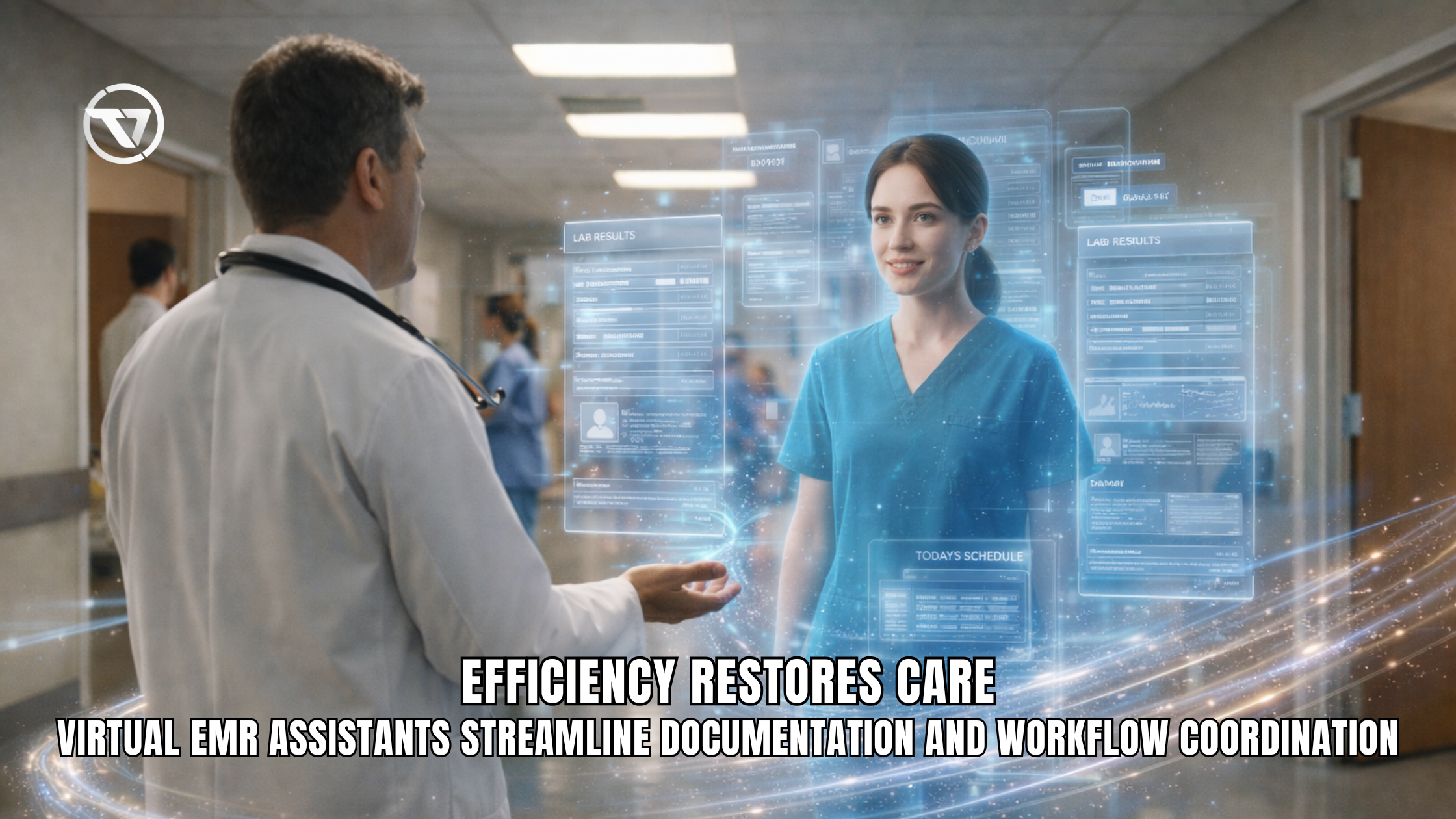
Why Real Estate Data Entry Is the Backbone of Modern Property Management
In the rapidly digitizing property market, precision, speed, and reliability in handling information are more critical than ever. At the heart of this transformation lies an unsung operational powerhouse: Real Estate Data Entry. From managing property listings and lease details to updating legal documents and CRM systems, data entry is foundational for real estate businesses striving for efficiency and scalability in both the US and the UK.
The Expanding Role of Real Estate Data Entry in a Data-Driven Industry
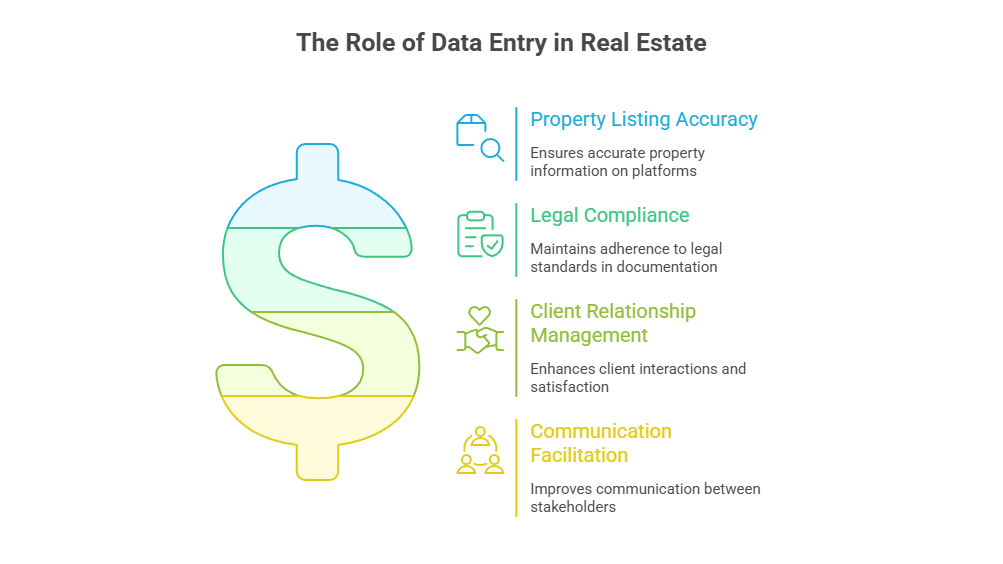
Real estate transactions generate vast amounts of data, including property descriptions, transaction histories, legal documents, client information, pricing updates, tax records, and more. Managing this volume with accuracy is non-negotiable in today’s competitive marketplace. That’s where data entry comes in.
Professionals in this domain ensure that structured and unstructured property-related data is digitized, formatted, and updated into CRM platforms, Excel databases, or cloud-based management systems. These entries drive:
-
Property listing accuracy across platforms like Zillow, Rightmove, and Realtor.com.
-
Compliance with legal standards (especially in lease and deed documentation).
-
Better client relationship management (CRM).
-
Smoother communication between agents, brokers, and property owners.
Real estate data entry services are no longer just about typing—it’s about structuring the backbone of a business’s operational ecosystem.
According to Netsuite, companies that prioritize accurate and consistent real estate data entry report higher productivity and customer satisfaction due to reduced administrative errors and faster property processing times.
The Rising Demand and Market Growth
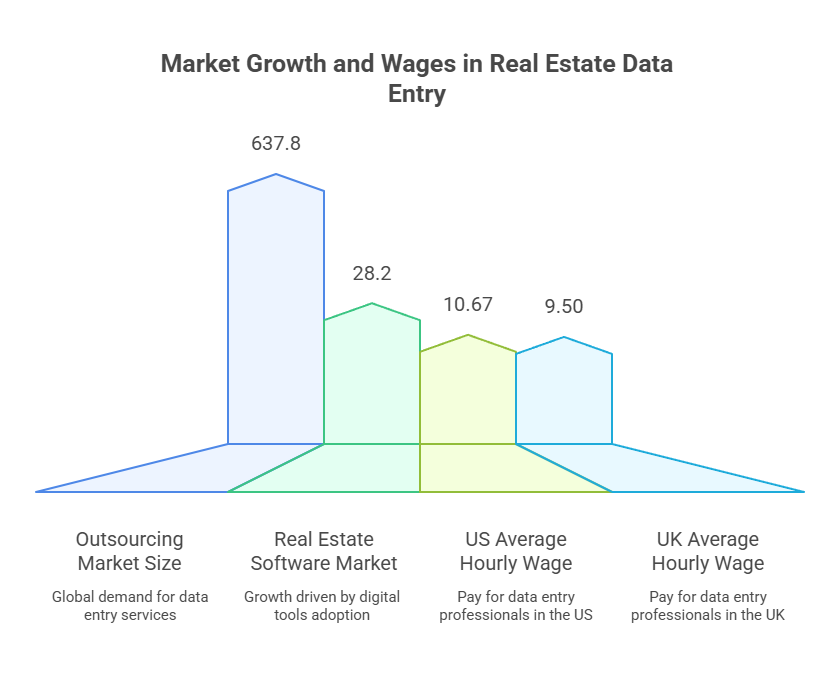
The demand for real estate data entry is rising globally, particularly as real estate businesses embrace digital workflows. The outsourcing market for real estate data entry is expected to reach approximately $637.8 trillion by 2024, with companies seeking cost-effective and high-accuracy solutions for managing property-related data at scale.
In the United States, the average hourly pay for real estate data entry professionals is around $10–$11.34, while in the UK, the average hourly wage ranges from £8.50 to £10.50, depending on experience and region. This affordability—paired with the value of precision—makes it one of the most outsourced tasks in the property business.
Moreover, the real estate software market is forecast to reach $28.2 billion by 2033, driven by increasing adoption of tools like CRM platforms, AI-based listing tools, and digital document repositories. This trend directly correlates with the demand for meticulous, scalable data entry.
Key Functions Performed by Real Estate Data Entry Professionals
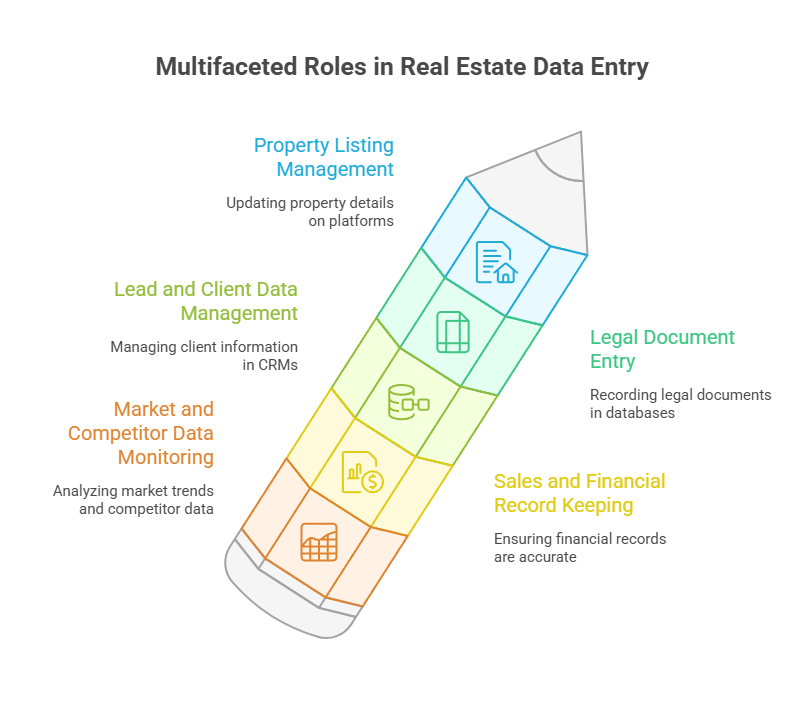
Real estate data entry isn’t a one-size-fits-all job. The professionals involved often wear multiple hats, depending on the needs of agencies, property developers, or legal teams. Core tasks include:
1. Property Listing Management
Updating MLS platforms or agency websites with new property data—such as address, square footage, photos, price, and availability—is a crucial task. A small error here can mean lost leads or compliance issues.
2. Legal Document Entry
Lease agreements, deeds, contracts, disclosures, and more must be recorded in CRM systems or archived databases. This ensures that sales or rental transactions can proceed without legal hurdles.
3. Lead and Client Data Management
Every prospective client interaction generates data—contact info, preferences, and financial details. Accurate entry into CRMs allows agents to follow up promptly and personalize their pitch.
4. Sales and Financial Record Keeping
Whether it’s sales commission details, property tax records, or escrow data, real estate data entry ensures that financial records are consistent and easily retrievable for audits or reporting.
5. Market and Competitor Data Monitoring
Some VAs and data entry pros are tasked with pulling data on market trends, competitor listings, or neighborhood pricing shifts to aid internal analysis.
Why Accuracy and Speed Matter in Real Estate Data Entry
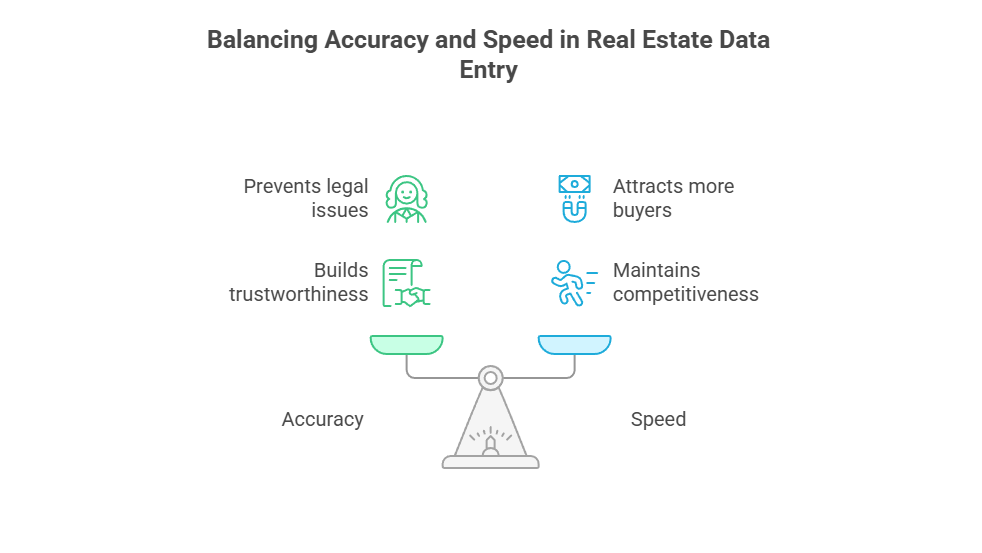
Inaccurate or outdated data can stall deals, cause legal disputes, or damage an agency’s credibility. For instance:
-
A missed zoning detail could void a property’s listing.
-
An outdated price might attract unqualified buyers or cause disputes.
-
A delay in updating the “sold” status could hurt your agency’s trustworthiness.
Because of these stakes, speed is essential but should never come at the cost of accuracy. This balance is why many businesses invest in dedicated virtual assistants or data entry services with quality assurance procedures in place.
The Shift Toward Outsourcing and Automation
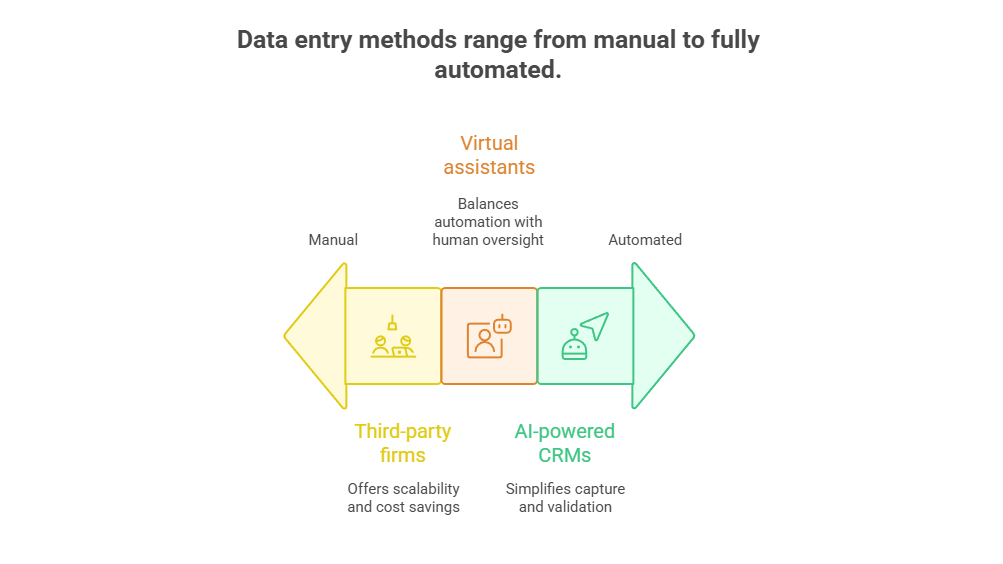
Real estate companies—especially in the US and UK—are increasingly outsourcing data entry functions to third-party firms or virtual assistant providers to save time, reduce overhead, and scale efficiently. Many offshore agencies offer 24/7 turnaround, multichannel data integration, and advanced security protocols.
At the same time, automation tools and AI-powered CRMs are simplifying how some of these entries are captured or validated. But automation is not foolproof. It requires human oversight for:
-
Catching context-sensitive errors
-
Verifying legal details
-
Formatting data in localized templates
-
Ensuring compliance with GDPR (in the UK) and other data regulations
Thus, a hybrid model—combining automation with skilled data entry professionals—is emerging as the industry standard.
TaskVirtual: Your Trusted Partner for Real Estate Data Entry
If you’re looking to delegate your real estate data entry tasks to a virtual assistant without compromising on quality, TaskVirtual’s real estate data entry service is a standout solution.
Here’s how TaskVirtual can help your real estate business thrive:
1. Expert Consultation for AI-Powered Data Handling
Whether you’re integrating CRM tools like Zoho or HubSpot or using custom listing platforms, TaskVirtual’s team helps you optimize data workflows. They offer smart consultation on using AI-driven tools without losing the human touch.
2. Affordable Pricing Models
TaskVirtual provides competitive packages starting from $3.12/hour to $14.99/hour, ensuring you get top-tier data entry services at a fraction of in-house costs.
3. Highly Rated Service
With 364 positive reviews and a 4.7-star rating on trusted VA review platforms, TaskVirtual has earned its reputation for reliability, speed, and precision, especially in real estate data workflows.
4. Data Confidentiality
The team adheres to strict data privacy protocols—perfect for real estate firms managing sensitive buyer, seller, and financial data in both GDPR-regulated UK and compliance-heavy US environments.
Whether you’re a solo agent, property manager, or a growing brokerage firm, TaskVirtual brings scale and accuracy to your backend, so you can focus on growing your listings and closing deals. With the help of a dedicated virtual assistant from TaskVirtual, your business gets the added benefit of flexible, expert-led support that evolves with your operational needs.
Tools Real Estate Data Entry Professionals Must Know
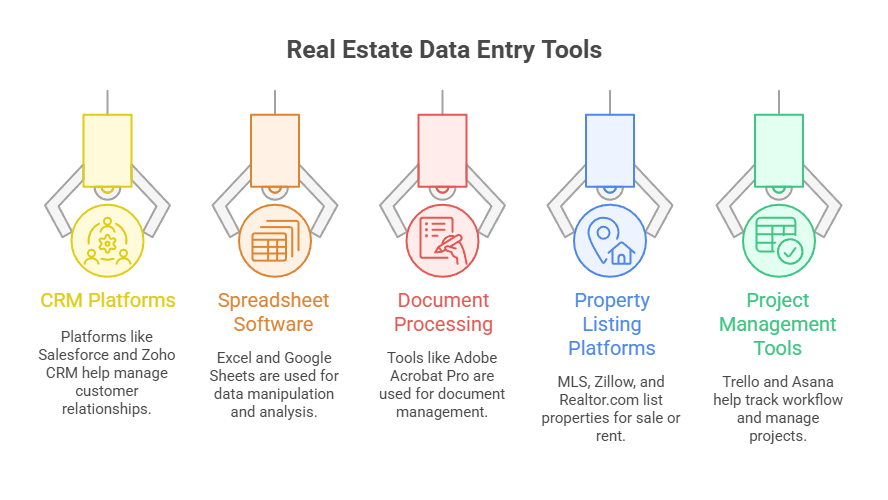
To keep pace with growing expectations, data entry specialists often work with:
-
CRM Platforms: Salesforce, Zoho CRM, HubSpot, Pipedrive
-
Spreadsheet Software: Microsoft Excel, Google Sheets with macros
-
Document Processing Tools: Adobe Acrobat Pro, DocuSign, PandaDoc
-
Property Listing Platforms: MLS, Zillow, Realtor.com, Rightmove
-
Project Management Tools: Trello, Asana, Monday.com (for workflow tracking)
Training and familiarity with these tools can drastically cut down turnaround times and improve error detection.
Final Thoughts: Data Entry Is a Profit Lever, Not Just a Task
It’s time for real estate professionals to view data entry not as a chore, but as a strategic pillar of success. A clean, organized, and constantly updated database means faster transactions, stronger compliance, and better client service.
In a landscape where first impressions are often made through property listings and digital interactions, you simply can’t afford sloppy data. By investing in professional real estate data entry—either in-house or via partners like TaskVirtual—you build the kind of operational foundation that scales with your ambition.



